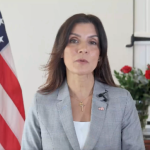Danny Shaw: Haiti has been a country that has been exploited, oppressed and misunderstood

American political analyst Danny Shaw.
Santo Domingo, DR
US political analyst Danny Shaw offered his perspective on the crisis in which Haiti has been mired for more than a year and on how susceptible the neighboring nation is to foreign military intervention.
During an interview granted to journalists of Listín Diario, the professor of the Public University of New York also defined the socio-political challenges of Latin America and analyzed the new tendency of the resurgence of left-wing governments in these countries, among other points.
Based on the recent call made by the Haitian Prime Minister, Ariel Henry, to the international community where he asked for the support of foreign troops for his country, which put on the table the possibility that this territory could be intervened, Shaw said that the measure would be exaggerated.
“I have been traveling to Haiti since 1998, and if there really is an intervention or occupation, it would be the fifth time in a hundred years that this country is under the command of foreign military troops,” said the analyst.
The professor added, “to understand Haiti one must go back in history and understand that this nation has never been poor, but an exploited, oppressed and misunderstood country.”
From his perspective, Shaw assured that the Haitian people do not need foreign interference. “They only need one simple thing: to be left in peace because they can determine their own future,” he added.
He also expressed that the international community has previously tried to “wash its hands” of the situation in Haiti, but that really, their economies and foreign capital are strongly linked to this nation, and it is for this reason that “nothing goes unnoticed in Haiti for them.”
When questioned on whether he believes that country can overcome the fuel shortages, health crisis, criminal gangs, and social unrest on its own, Shaw said yes, and that the mobilizations are a sign that the people want positive changes for their nation.
“What we are seeing right now is a continuation of the protests that started years ago, the people have the right to protest, to mobilize,” he explained.
Shaw indicated that his approach does not suggest that the road to recovering social peace in Haiti will be easy. However, he said he was convinced that the country “does not need walls, but bridges.”
Latin America and leftist governments
The rise to power of leftist governments in Latin American countries such as Chile, Colombia, Mexico, El Salvador, Argentina, and Peru was another phenomenon analyzed by the U.S. expert.
According to Shaw, the triumph of leftists such as Gustavo Petro, Gabriel Boric, and Andrés Manuel López Obrador in nations that have historically been under the rule of conservative parties is due to an erosion of the traditional socio-political system.
From his point of view, globalization never reached the region but only experienced a “gringolization.”
He explained this because it was not a balanced exchange between these countries and the great powers. Still, there have always been more benefits and advantages for the Japanese, North American, French or English capital.
“The Colombian, Peruvian, Chilean, Argentinean and Mexican peoples got tired of so much exploitation, and this situation has given these presidents the opportunity to come to power,” he said.
Shaw said that Latin governments are evoking creating their dream of strengthening their child. “That should be the path, that no Latino youth should have to leave their country to see their dreams come true,” he said.
He emphasized that leftist governments are not always successful for these nations, and proof of this is the crisis in which Venezuela is immersed.
U.S. interference
“We are in a time where the unilateral model of the United States has proven to be a failure and the peoples are realizing that,” said the analyst referring to the role that the North American nation has played throughout the last centuries in the socio-political reality of the region.
Thus, Shaw considered that it is possible to talk about the fact that the economic power of the United States over the Latin American region is in decline. However, the military force is maintained.
“Dominican Republic is going to be the last neo-colony of the United States, I believe that this country bases 50% of its economy in the commercial exchange with the United States and I doubt that the president wants to change that to associate with another power, for example, China”, he added.
However, he added that the perspective to follow should be to end this historical dependence to have more integration, unity, and multilateral initiatives.
Mobilizations
Taking stock of the most recent outbursts and social mobilizations in Latin America, the analyst expressed that they are favorable for the strengthening of democracy.
“Historically, we have stated that mobilizations are the prelude to something greater, to a real change; a mobilized people is a conscious people,” said the professor.
Finally, he considered that for any transcendental socio-political change in the region and in the world, the media and, lately, the social networks have a significant weight in the agendas of the countries and have the power to make visible some issues over others, so they must ensure that there is no censorship and coverage is given to all the facts.

















So, if everybody just look the other way and ignore whats going on in Haiti and their 300 year old crisis it will fix itself. This guy is genius.
The leftist fix for every geopolitical issue.
One thing that is sure is that DR should mind its own business. Break all realtions with haiti, build the wall and seal the border.